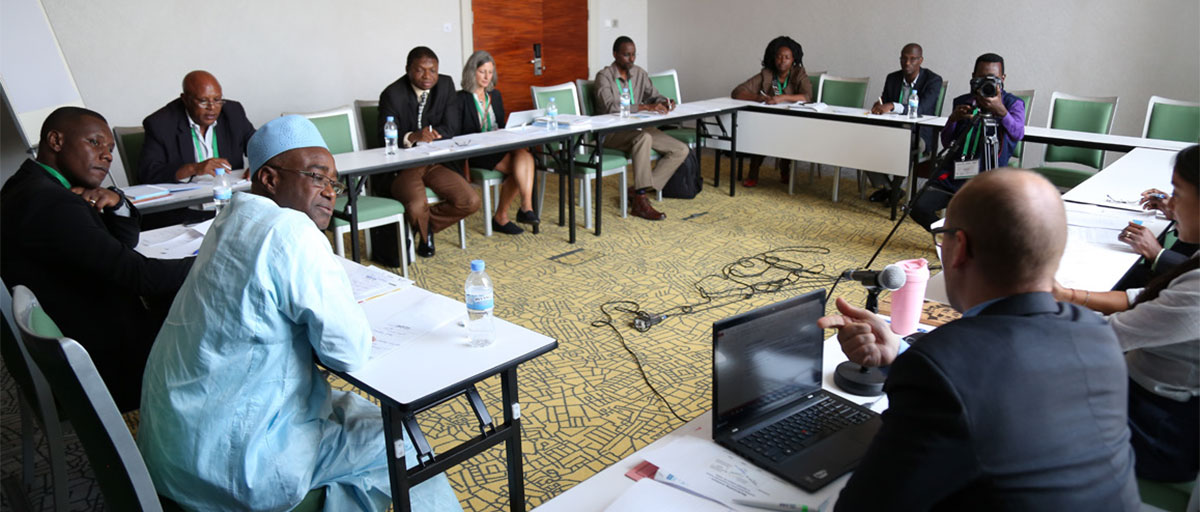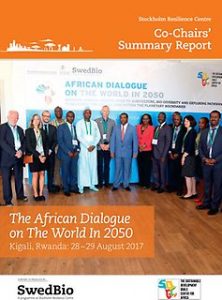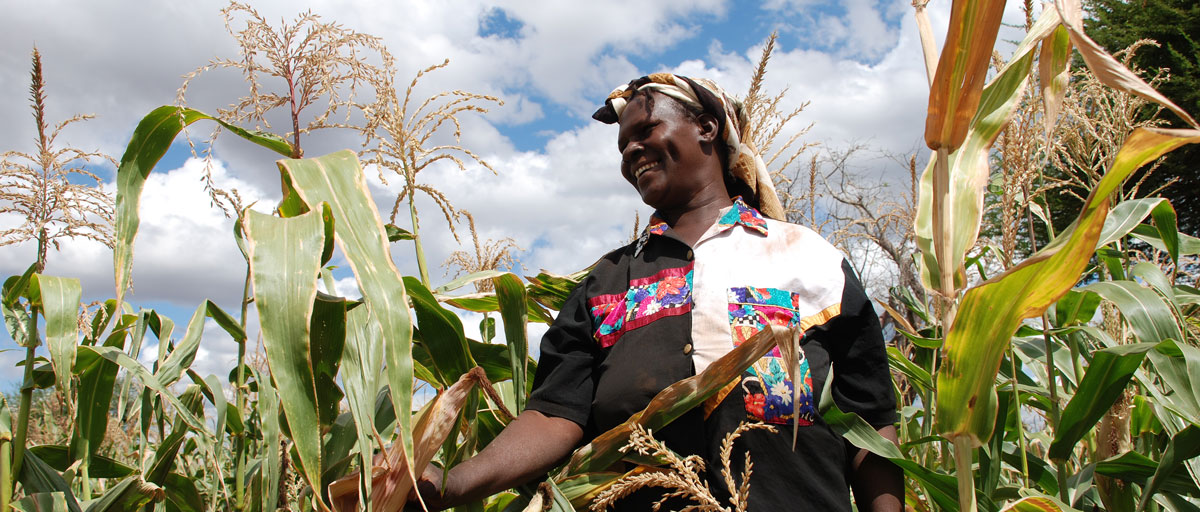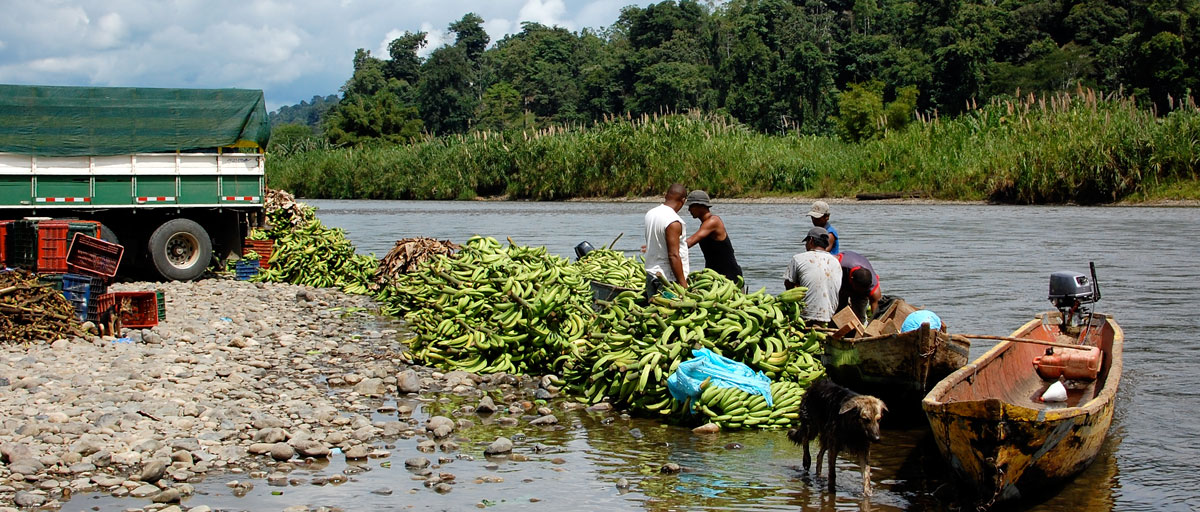
In August 2017, SwedBio at Stockholm Resilience Centre and the Sustainable Development Goals Center for Africa brought together governments, the private sector, academic institutes, civil society, UN and various other policy-influencers to discuss how agriculture can contribute to meeting the UN Sustainable Development Goals (SDGs).
Bildtext får vara max två rader text. Hela texten ska högerjusteras om den bara ska innehålla fotobyline! Photo: B. Christensen/Azote
Standfirst
How agriculture can contribute to meeting the Sustainable Development Goals
Ten key messages from the African Dialogue on The World In 2050
Text
In August 2017, SwedBio at Stockholm Resilience Centre and the Sustainable Development Goals Center for Africa brought together representatives of governments, the private sector, academic institutes, civil society, UN and other international organizations and other policy-influencers to discuss how agriculture can contribute to meeting the UN Sustainable Development Goals (SDGs).
Implementing the SDGs requires concerted actions and visions for a different future in which the goals are reached within the just and safe operating space of the planet –the Planetary Boundaries.
The co-chairs’ summary report summarizes the dialogue that was co-chaired by Belay Begashaw from SDG Center for Africa and Johan Rockström from Stockholm Resilience Centre.
The report contains the following 10 key messages:
The world in 2050 is being shaped now: The challenge of eradicating hunger, transitioning to sustainable food systems and healthy diets in Africa and ensuring that SDGs are met within the planetary boundaries - lies in our hands. Systemic, long-term perspectives are needed to ensure that activities synergize.
Africa plays a key in shaping the world's sustainbable development to 2050 and beyond: Signing declarations and treaties signals the will to action, but it is the actual implementation, especially in developing economies, that shapes the world.
Sustainably eradicating hunger and attaining resilient food security in Africa requires a flourishing natural environment: Good nutrition goes hand in hand with diversified foods from diversified crops. Governments should promote healthy and nutritious diets through diversification of food crops. Agricultural practices need not compromise with the regenerative capacity of the biosphere. Maintaining the variety of life and the quality of soils underpins the agricultural sector for the long term, which in turn shapes human well-being.
Africa's rich agro-biodivesity must be valued and maintained to build resilient food systems: Governments should formulate and operationalize land planning and other agri-policies that support ecosystem services, and balance the prevailing input-dependent monocrop model with policies that support seed and livestock diversification and organic farming methods.
Empowering women farmers' yield benefits for food security and sustainable livelihoods: Rural women make a critical but under-recognized contribution to Africa’s agriculture. Policies to close the gender gap in rights, political participation, and ownership of land and other assets bring benefits to countries and communities as well as households.
African cultural values for food and agriculture need reviving in communities, and recognition and protection in policy: The relationship that Africans have with their land and food systems is the bedrock for building a better future. Agriculture has been practiced in Africa for thousands of years. Food is more than commodity for most African countries. Its deeper cultural value confers much needed social-ecological resilience, and can also contribute to biodiversity and adaptation to climate change.
Livelihoods in the agricultural sector and rural areas ned to seen as attractive: Fragmentation of communities, demographic and economic pressures, and degradation of natural resources have reduced the attractiveness of rural areas. This perception is particularly prevalent among the youth, and risks causing a sector-speci c brain drain that harms the sustainability and effectiveness of the agricultural sector at large. Incentives and policies to retain youth and increase women’s participation in agribusiness may counteract this development.
Insights from science and technology ought to be combined with knowledge from local communities: Traditional, indigenous and local knowledge enrich agricultural practices by adding place-speci c knowledge and awareness of diversity of circumstances. To nurture and utilize this knowledge, policies and governance systems need to be formulated in a context-aware manner.
Policies need to recognizxe and navigate cross-scale social-ecological complexity: Resilience focuses on change and stability, in social and ecological systems ranging from communities up to the global scale. Managing change in either social or ecological systems depends on understanding how these systems interact, because actions in one domain often have unintended and sometimes unexpected consequences in the other. Policies focused on global priorities, such as climate, need to consider effects on local realities in order not to jeopardize implementation of other SDGs. It is vital to acknowledge the multiple roles, functions and impacts of agriculture for social-ecological resilience and well-being.
Agriculture is key to acheiving SDG Goal 16: Successfully achieving the SDGs hinges on strong and accountable institutions, inclusive and effective decision-making processes, and societal equality and equity. Ensuring resilient agriculture and agro- biodiversity in Africa both builds and depends on stronger communities that can participate more actively in sustainable development.









